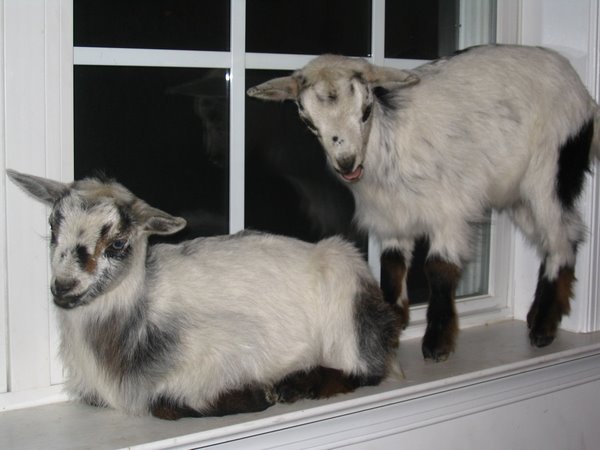I've been contemplating the matter of sheltering, or shielding our children (especially after a Catholic, homeschooling friend of mine asserted a few weeks ago that she did not want her children to be sheltered and wanted them to associate with other kids who have not been sheltered--whatever that means), and have been collecting various morsels on the matter from my spiritual reading, other friends, priests, and of course, my mother, which I will post after I've wrapped my mind around them and they take shape.
For today, however, I found the reading from my Imitation of Mary to be quite relevant, and a good start to any thorough examination of the matter. But first, a preface:
There is a funny trend among some folks nowadays of accusing certain parents of sheltering their children, as though it were a bad thing. I find it rather odd, as I’m sure the same folks would not look favorably on the alternatives. Why, if I were to cast my children out of our rather comfortable home to live in the barnyard with the goats, year round, what would they think of me then? If I were to carelessly expose them to every sort of disease and bodily peril I would surely be dragged into court by child protective services for reckless endangerment and most likely loose custody of my children all together. Suppose I were to feed them only what we would otherwise throw into the compost bin? Or make them to clothe themselves in whatever they may scrounge up from the woods? It is a funny thing indeed for some folks to accuse certain parents of sheltering their children when these same folks would never do without shelter themselves.
Of course, living in a material world we place much more importance on the material, which includes, of course, our bodies and those material things we shelter them with. But Catholic parents are keenly aware of the existence of the soul in the spiritual world, which includes Heaven and Hell, which endures for eternity. This is why I am utterly baffled when I hear good Catholic parents proclaim that they do not want their children to be sheltered. Of course, I know they are not referring to their children’s bodily sheltering, but to the sheltering of their spirits, their minds and hearts and souls, from the onslaught of a Godless world. How do they expect to make a strong case for themselves when they stand before the Heavenly court, whose justice is perfect and will be neither deceived nor persuaded by even the most brilliant rhetorician?
Perhaps it would be best to back up for a moment and explore what it means to shelter or not to shelter a child. I have long revered the analogy of a child to a plant, which, when set in a good environment, exposed to what is good for it’s growth: ample, but not too much sunlight; nutritious but not too rich soil; sufficient, but not excessive uncontaminated water; pruned each year a little but not too much; and shielded from what is harmful to it’s growth—harsh winds, cold, insects that feed on its leaves, flowers and fruits, etc. will grow to it’s full potential, strong and beautiful, able to withstand the elements that in it’s youth threatened it’s very existence. A certain amount of sheltering is necessary for the survival of every living thing.
Shielding, or sheltering our children, in my mind is no more than protecting their virtue. In the Imitation of Mary we read:
“Mary was conceived in God’s grace; there was no trace of sin in her nor any inclination to sin. Therefore, unlike us, she had no reason to hear falling into sin. Yet, if you were to judge by the way she acted, you would say that she had as much reason to fear it as we do, or even more than we do?
“She watched constantly over her own heart as though creatures could have drawn her affections to themselves. She watched over her every word as though she could not trust her tongue.
“In her conception she was given all the privileges that go with sinlessness, yet she decided to live permanently as a penitent?
“We, on the contrary, are surrounded by flattering, treacherous enemies whose sole aim is to use our natural weakness to bring about our fall. Yet we have no fear and are not watchful at all!
“We admit that we are weakness incarnate, yet frequently we expose ourselves to temptations that would bring down even the strongest soul.
“When weakness is compounded by presumption, does it not deserve to lose all that supports it and gives it strength?
“We carry the treasure of grace in a very weak vessel (2 Cor. 4, 7), that can shatter when we least expect it.
“How many enemies are trying to snatch this treasure from us? Enemies within, enemies outside, enemies all around us.
“Within us, there are the passions we have not sufficiently mastered; outside, the spirit of darkness; around us, a corrupt world. Like a flame not fully extinguished, our passions can always be rekindled and light a fire.
“Even if we were, like St. Paul, snatched up to the third heaven (2 Cor. 12, 3), we would still have to fear being cast down with the rebellious angels into the bottomless abyss.
“It is not enough to assure ourselves that our sentiments are heartfelt and our resolution fervent.
“A single inopportune occasion is enough to destroy us.”
Perhaps the real problem lies in all the current blather about universal salvation, and the eclipse of the traditional teaching that if one dies with even one mortal sin on his soul he WILL suffer eternal fire.
Happy parenting!
Tuesday, August 14, 2007
To Shield or Not To Shield
Subscribe to:
Post Comments (Atom)







No comments:
Post a Comment